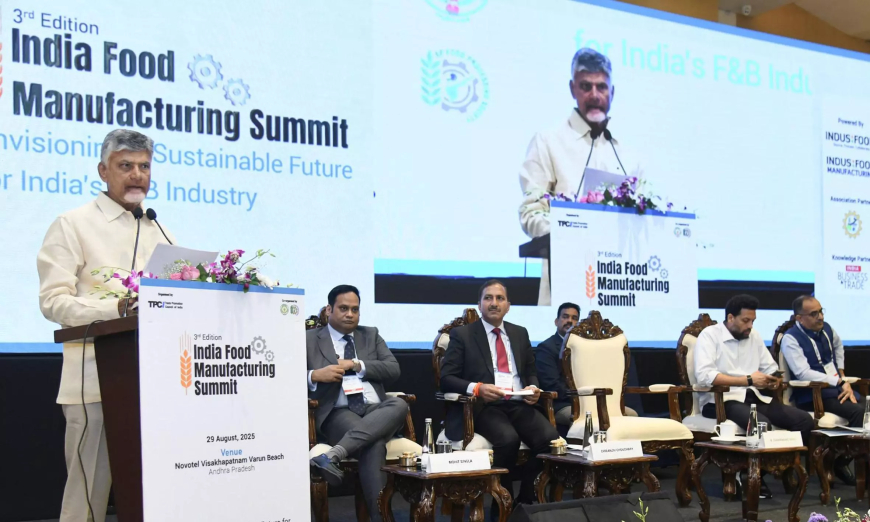Planting the Seeds of Transformation: Andhra Pradesh’s Food Processing Revolution
Andhra Pradesh sets Rs 30,000 crore investment target in food processing, aiming 3 lakh jobs with Naidu’s vision for global agro growth.

Introduction
Andhra Pradesh is sowing the seeds of a transformation. With a bold Rs 30,000-crore investment goal and a promise of generating 3 lakh jobs within five years in its food processing sector, Chief Minister N. Chandrababu Naidu is charting a new era of prosperity and value-addition across the state. This blog explores the vision, execution plan, geographical focus, and implications—both positive and negative—of this ambitious undertaking.
Historical and Policy Backdrop
Naidu unveiled this initiative at the India Food Manufacturing Summit, emphasizing the state’s existing strengths—nine integrated food parks, plug-and-play infrastructure, cold storage, and warehousing—all supported by the newly introduced Food Processing Policy 4.0, offering investment and power cost subsidies alongside single-window clearances.
Currently, AP contributes 9% of India’s national food processing output (~$49 billion) leads with 15.6% of India’s fruit production, and contributes 32% of its marine seafood exports—bolstered by 2.26 lakh acres under aquaculture and roughly 6,000 active food processing units.
Naidu also underscored that only about 12% of produce is processed currently, and the target is to scale that up to 50–70%, minimizing wastage and maximizing farmer returns.
What CM Naidu Is Planning: Strategy and Locations
-
Integrated food parks: Nine functional hubs with plug-and-play amenities and cold storage across the state.
-
Agro clusters: Region-specific clusters targeting fruits, spices, aquaculture, cocoa, and coffee in districts like Guntur, Chittoor, Coastal Andhra, and Visakhapatnam.
-
Industrial parks across constituencies: A plan to establish food & beverage units in each of the state’s 175 constituencies.
-
Statewide infrastructure: Vacant land, river water supply, and multi-season climatic zones set the stage for expansion.
-
Dairy and pulp units in Kuppam: Shreeja Mahila Milk Producer Company and Mother Dairy are setting up processing units—dairy and fruit pulp—in Naidu’s home constituency, expected to generate ~8,000 jobs.
Additionally, the TPCI announced its southern regional office launch in Amaravati—a strategic move enhancing investor facilitation.
Potential Benefits and Strengths
-
Job creation: 3 lakh jobs over the next 4–5 years—spreading employment across rural and semi-urban areas.
-
Value addition: Transforming raw produce into packaged goods, reducing waste and enhancing farmer incomes.
-
Infrastructure readiness: Robust setup—food parks, cold chains, and clusters for crop-specific processing.
-
Investor-friendly environment: Subsidies, streamlined approvals, and single-window systems streamline setup.
-
Balanced regional growth: Industrial parks across constituencies and clusters spread economic impact equitably.
-
Farm-to-market linkages: Local sourcing for processing units—especially in Kuppam—can enhance farmer integration.
-
Strategic positioning for exports: Taps into AP’s leadership in fruit, aquaculture, and spices, serving both domestic and global markets.
Challenges and Considerations
-
Execution risk: Securing Rs 30,000 crore investment and meeting job targets hinges on attracting and retaining investors.
-
Quality challenges: Naidu flagged a need for "product perfection" to build global brands—India still trails in this arena.
-
Single-window effectiveness: Promises of smooth clearances must translate into on-ground efficiency for timelines to hold.
-
Sustainability concerns: Large-scale agro-industrial growth could strain water resources, especially in sensitive zones.
-
Skill mismatch: Job creation must be paired with training to ensure labor is skilled enough for modern processing roles.
-
Market volatility: Global matrix—tariffs, fluctuating demand—could disrupt exports and enterprise viability.
Final Thoughts
CM Naidu’s vision for transforming Andhra Pradesh into a global food processing powerhouse is both grand and promising. Anchored in infrastructure, regional inclusion, and bold targets, the vision positions AP for a decade of robust agro-industrial transformation.
But ambition alone isn't enough; the state's ability to finesse execution—through quality control, investor outreach, equitable growth, and sustainable practices—will determine whether this vision sprouts into long-term prosperity or wilts under its own weight.
If the state can meld value addition with global standards, empower its farmers, and nurture an ecosystem of innovation and inclusion, Andhra Pradesh could well emerge as India’s food processing flagship.

 Ellofacts
Ellofacts 





